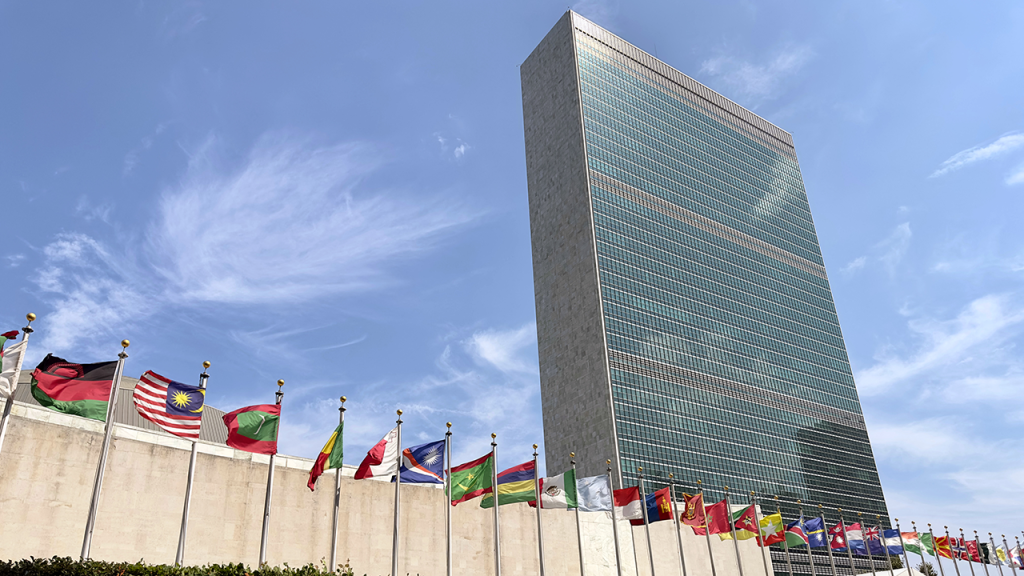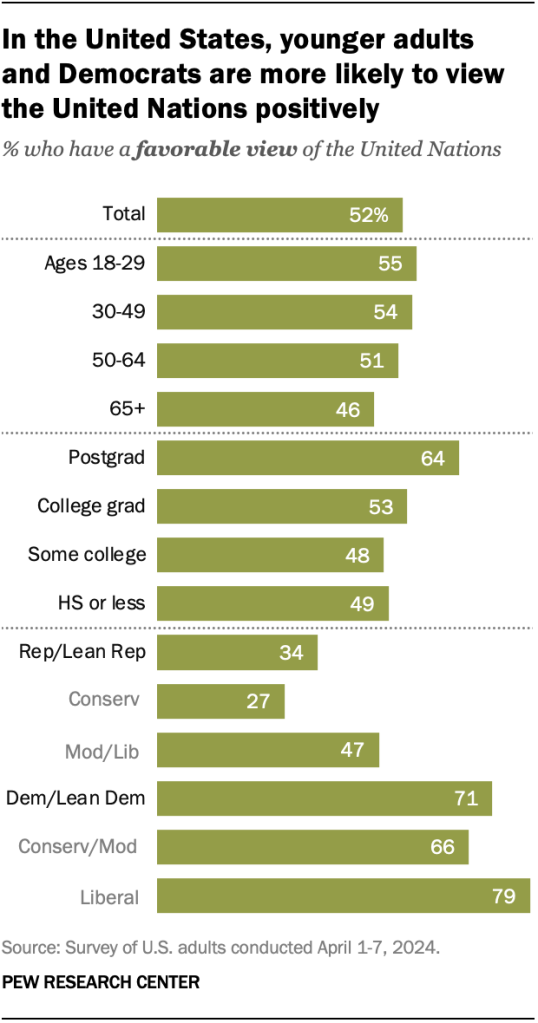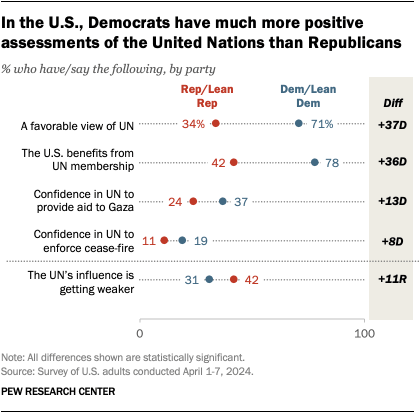
Over the past year, Americans’ views of the United Nations have become slightly more negative, according to a new Pew Research Center survey. Today, 52% of Americans view the organization favorably, down from 57% in 2023.
Pew Research Center conducted this analysis to examine Americans’ views of the United Nations. For this analysis, we surveyed 3,600 U.S. adults from April 1 to 7, 2024. Everyone who took part in this survey is a member of the Center’s American Trends Panel (ATP), an online survey panel that is recruited through national, random sampling of residential addresses. This way nearly all U.S. adults have a chance of selection. The survey is weighted to be representative of the U.S. adult population by gender, race, ethnicity, partisan affiliation, education and other categories. Read more about the ATP’s methodology.
Here are the questions used for this analysis, along with responses, and its methodology.

U.S. adults under age 65 are more likely than those 65 and older to have a favorable opinion of the UN. And those with a postgraduate degree are more likely than those with less education to hold this view.
Americans’ views of the UN are most strongly divided along partisan and ideological lines. Democrats and Democratic-leaning independents are more than twice as likely as Republicans and Republican leaners to have a favorable view of the UN (71% vs. 34%).
Conservative Republicans are the least likely to see the UN favorably, while liberal Democrats are the most likely to favor it.
We also asked Americans about more specific aspects of the UN, including questions about the benefits of membership and the organization’s influence in the world. On most questions, assessments are more positive than negative, though there are persistent differences by political party and age.
Benefits of U.S. membership in the UN
Americans generally see the country’s role in the UN as beneficial for the United States. But this view has become somewhat less common since the last time we asked this question.
In 2022, 66% of Americans said the U.S. benefits from being a member of the UN, compared with 60% who hold this view today. And the share who say the U.S. benefits a great deal has dropped from 30% to 23%.
Over a third (37%) currently say the U.S. does not benefit from being a member of the UN.
The UN’s influence in the world
When asked about the influence of the UN in the world, 48% of Americans say it is unchanged in recent years. Around a third (35%) say the UN’s influence is getting weaker, while 13% say it is getting stronger.
A separate Center analysis finds that, when Americans are asked to rate different foreign policy goals for the U.S., only 31% say strengthening the UN should be a top priority.
UN efforts in Gaza
Americans tend to rate the UN’s impact in Gaza more negatively than they rate the organization overall.
For example, 29% of Americans say they have a great deal or fair amount of confidence in the UN to provide effective humanitarian aid to Gaza. Roughly half (51%) do not have confidence in the organization’s ability and 19% are unsure. However, it’s worth noting that multiple countries and organizations have been struggling with humanitarian aid for months.
In addition, only 15% of Americans say they have confidence in the UN to enforce a cease-fire between Israel and Hamas. Another 67% have no confidence and 17% are unsure.
Notably, a recent Center survey found that only 12% of Americans believe that lasting peace between Israelis and Palestinians is at least somewhat likely. So Americans may not be optimistic about a cease-fire regardless of who attempts to enforce one. And, though the UN recently approved a resolution demanding a cease-fire between Israel and Hamas, negotiations between the two groups have been unsuccessful.
Partisan differences in views of the UN
Democrats are much more likely than Republicans to express positive views of the UN on every question asked.

For example, over three-quarters of Democrats believe UN membership benefits the U.S., compared with only 42% of Republicans. Liberal Democrats are the most likely – and conservative Republicans are the least likely – to say the U.S. benefits from its involvement in the UN.
Republicans are less likely now than in 2022 to say the U.S. benefits from participating in the UN, while Democrats are about as likely to say this now as they were in 2022.
In 2022, 49% of Republicans said the U.S. benefited from membership in the UN, compared with 42% now.
Democrats are also significantly more likely than Republicans to have confidence in the UN to provide humanitarian aid in Gaza and enforce a cease-fire between Israel and Hamas. Still, a minority of Democrats say this.
In addition, Democrats are much less likely than Republicans to say the UN’s influence in the world is waning. Instead, they tend to see the UN’s influence as stable.
Age differences in views of the UN
On most questions, U.S. adults under 30 have more positive views of the UN than those ages 65 and older. For instance, younger adults are more likely than older adults to see the benefits of the country’s involvement in the UN. About two-thirds of those under 30 (66%) say the U.S. benefits at least a fair amount, while 57% of older adults share this view.
Adults under 30 are more likely than older adults to believe the UN’s influence in the world is getting stronger or staying the same, and less likely to believe it’s getting weaker.
However, younger adults do not have more positive assessments than older adults of the UN’s efforts in Gaza. Instead, they are more likely than older adults to be uncertain of their confidence in the UN when it comes to providing humanitarian aid to Gaza or enforcing a cease-fire.
Note: Here are the questions used for this analysis, along with responses, and its methodology.
